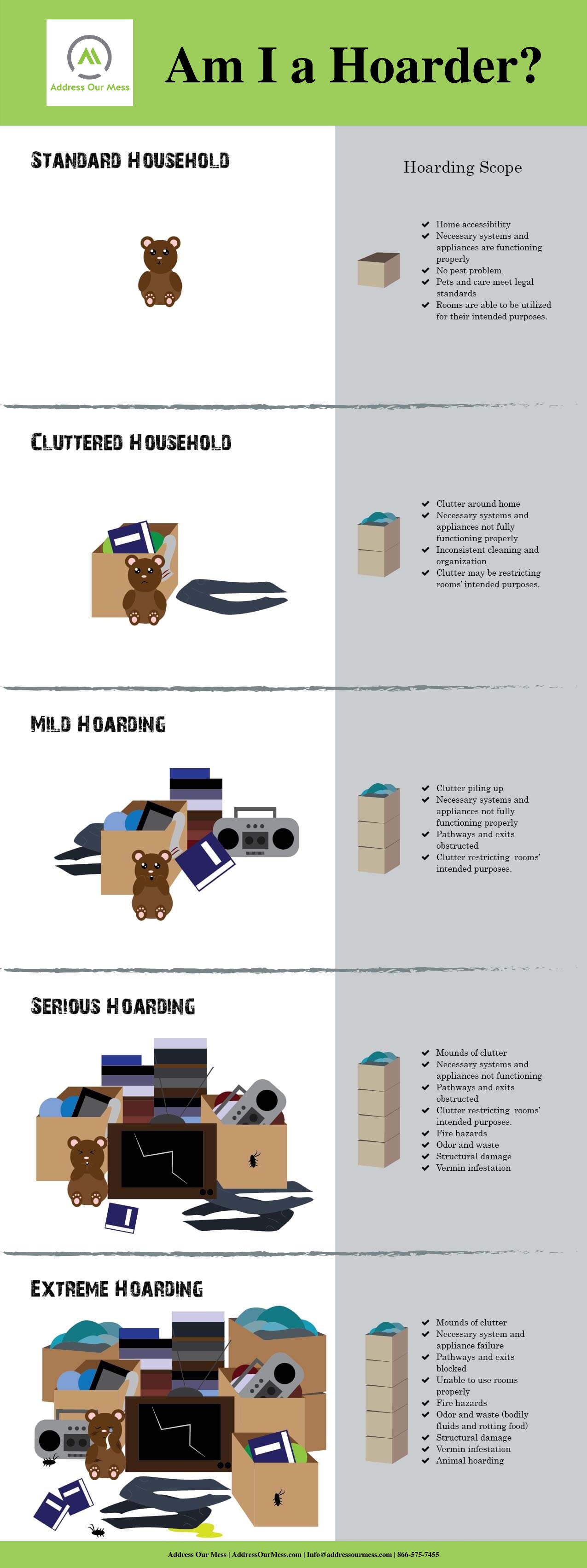Are You a Hoarder?
Some individuals enjoy maintaining an immaculate environment while for others, cleaning is more of a dreary and taxing task. There are people who live the life of a minimalist and others who are considered extreme hoarders. If you are having trouble distinguishing the condition of your home or that of someone you know, this guide (to the right) makes it possible to determine where on the hoarding scope someone falls.
The average person has a relatively orderly household. A few items scattered around do not make a hoarder. A perfectly immaculate home does not need to be the standard but general qualities of an uncluttered home are listed below.
Standard Household (Uncluttered Home):
- Doors, windows, pathways are accessible.
- Necessary plumbing, electrical, appliances, HVAC (heating, ventilating, and air conditioning) are functioning properly
- No pest problem is evident
- Any animals within the home are able to be properly cared for and meet legal standards
- Rooms are able to be utilized for their intended purposes.
If the home is a little less organized and maintained than the standard description, there may be a clutter concern. A home that is cluttered, but not too extreme, may exhibit some of the traits below.
Cluttered Household (Moderately Cluttered):
- There is some clutter around exits, entrances, and pathways
- An HVAC, appliance, plumbing, is not fully functioning
- Clutter may be restricting room functions
- Inconsistent household cleaning and organization
After the level of clutter, the next level reaches hoarding proportions. Hoarding situations can vary in severity, depending on the individual situation. The mild level of hoarding may exhibit some of the traits below.
Mild Hoarding:
- Clutter piling up
- Pathways, doorways, and/or windows are obstructed
- Little to no structural damage
- Broken appliances
- Rooms’ intended functionality is restricted
Now, if the hoarding situation extends beyond these symptoms, the situation starts to reach more critical levels. When the hoarding becomes serious, some conditions that may be exhibited are listed below.
Serious Hoarding:
- Mounds of clutter throughout the home
- HVAC, plumbing, electrical, etc. failure
- Fire hazards due to blocked outlets and/or flammable materials
- Broken and duplicate appliances
- Pet odor and/or visible waste is present
- Structural damage
- Vermin infestation
Finally, hoarding can even extend to extreme and life threatening conditions. These situations need to be addressed as soon as possible to minimize/prevent injuries and even death. Homes that have reached such extreme measures may include some of the conditions below.
Extreme Hoarding:
- Masses of clutter taking over the home
- Exits and pathways blocked by mounds of clutter
- Fire hazards due to stacking and flammable materials (i.e. hazardous materials or chemicals)
- Inability to utilize intended room purposes
- Broken/unusable appliances, HVAC, etc.
- Extreme structural damage that can result in injury
- Extreme vermin infestation
- Animal hoarding – the animals have reached quantities and conditions in which they are unable to receive proper care and nutrition, leaving their safety and lives at risk
- Animal and/or human feces, urine, vomit, blood, or other bodily fluids are present
- Expired/rotting food
Upon reviewing the levels and conditions of hoarding, although not an official diagnosis, it is possible to establish whether or not you or someone you know may be exhibiting hoarding behaviors. For common household maintenance concerns, keeping up with general housekeeping should maintain a sanitary standard. When levels reach that of a clutter or hoarding situation, it’s time to call in the professionals. Address Our Mess is highly-trained and qualified to assist with clutter and hoarding clean ups. Our professional staff is able to work with the residents in order to efficiently complete the cleanup and restore a home to livable standards while simultaneously maintaining respect and compassion for the individuals involved.
Call 410-589-2747 or email info@addressourmess.com for more information. We are here to help!
